Updated: January 2025 | Author: Dr. Khushbu Jain | Reviewed by: Dr. Anant Bagul (Orthopedic surgeon and stemcell specialist)
Are you wondering if the right diet can truly make a difference in the life of a child with autism?
Many parents face the same question, searching for ways to support their child’s development through food choices.
Autism Spectrum Disorder (ASD) often comes with unique nutritional challenges, such as sensitivities to certain foods and the need for specific nutrients. Understanding the role of diet in improving focus, communication, and overall well-being is essential.
With the right Indian diet for autism, you can provide your child with the nourishment they need to thrive. From boosting brain health to improving digestion, this blog explores the best foods to include and avoid, empowering you to make impactful dietary changes.
Let’s start with foods to avoid before moving on to foods that should be included in the diet of a child with autism.
Foods That an Autistic Child Should Avoid
Creating a dietary plan for children with autism involves identifying beneficial foods and recognizing those that may pose challenges.
Here’s a concise list of foods to avoid and choices that could impact sensory sensitivities and overall well-being for children on the autism spectrum.
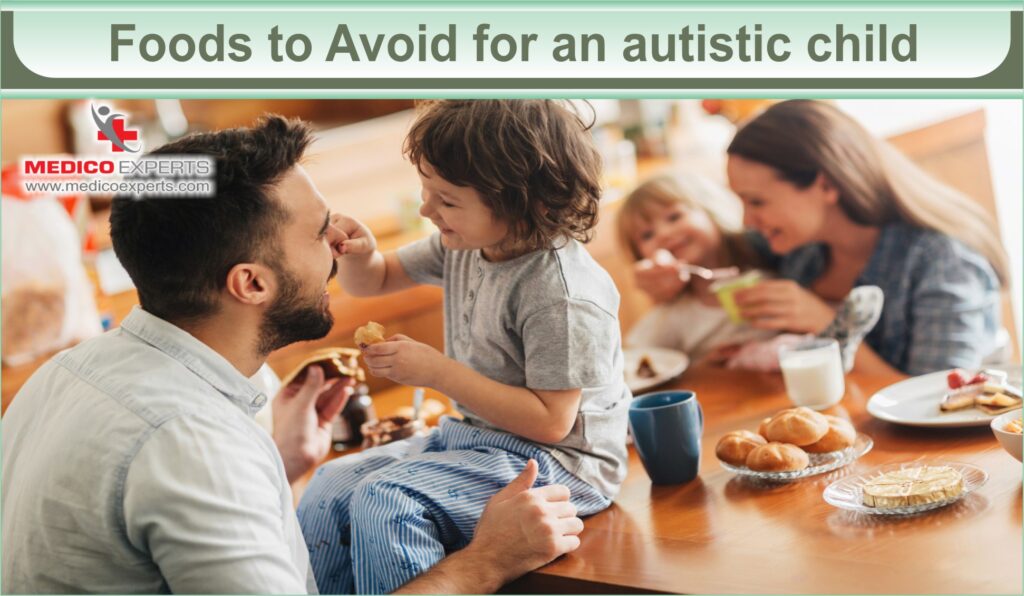
1. Gluten-Free and Casein-Free Diet
Autism is a neurodevelopmental disorder in which the child becomes hypersensitive or hyposensitive to various sensory stimuli. Since the conventional treatment for autism acts slowly and may not always be helpful, many parents look for alternative remedial measures such as diet.
Autistic children are often sensitive to gluten and casein.
Gluten-free food includes food that is not derived from wheat or barley. The casein-free (Rice, Soy, or Potato-Based milk Pareve) diet includes food that does not contain milk protein.
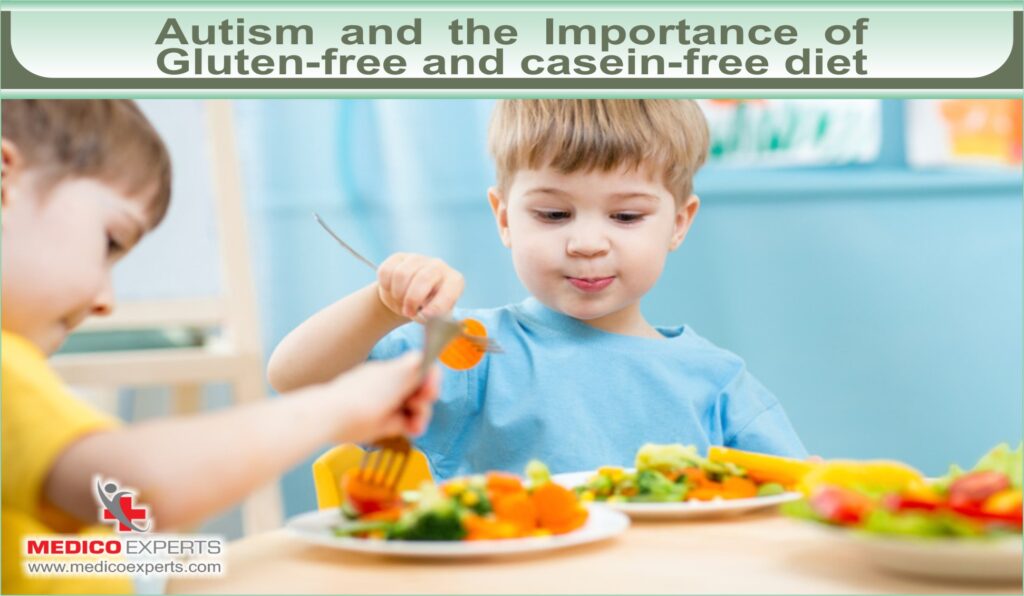
Gluten-rich and casein-rich food may interact with folic acid absorption and increase neurodevelopmental weakness symptoms in autistic children.
Moreover, the casein protein may cause gastrointestinal problems in autistic children who are prone to digestive problems and may not be able to digest milk items easily.
Children like cheese, flavored yogurt, and chocolate milkshakes, but all these items may be avoided as they are a rich source of casein protein.
2. Avoiding Artificial Ingredients, Mercury, and Polyvinyl compounds
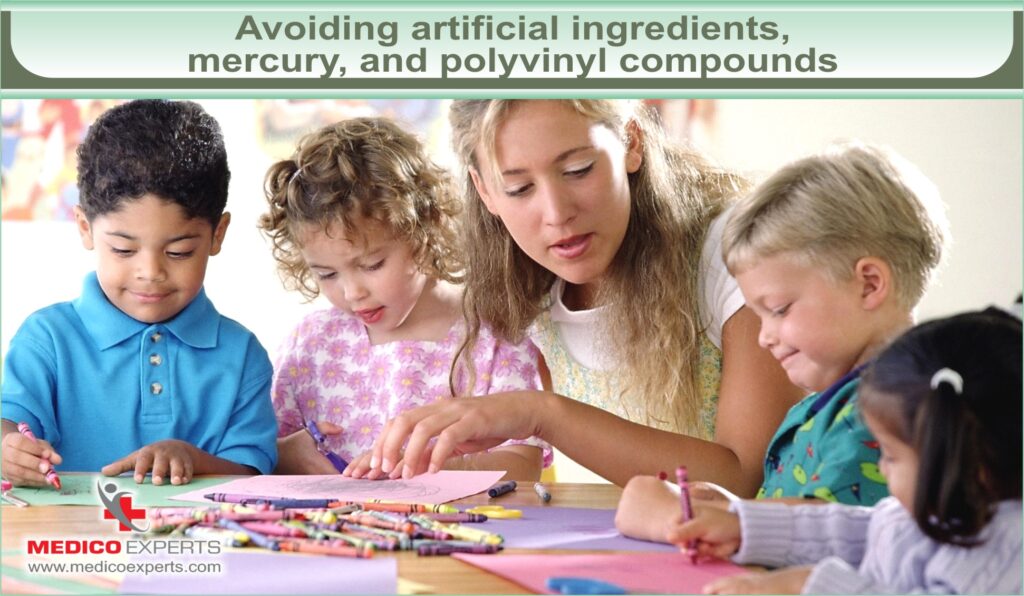
Artificial ingredients in food like additives, preservatives, added colors and flavors are not good for the health of the brain of autistic children and these ingredients also slow down the growth.
Some food like red meat and sea fish may also contain mercury which can be toxic for autistic children.
Unwashed vegetables and milk may also contain pesticides (polyvinyl compounds) which are not at all good for the health of autistic children.
3. Avoiding Sugar, artificial sweeteners, and monosodium glutamate (MSG)
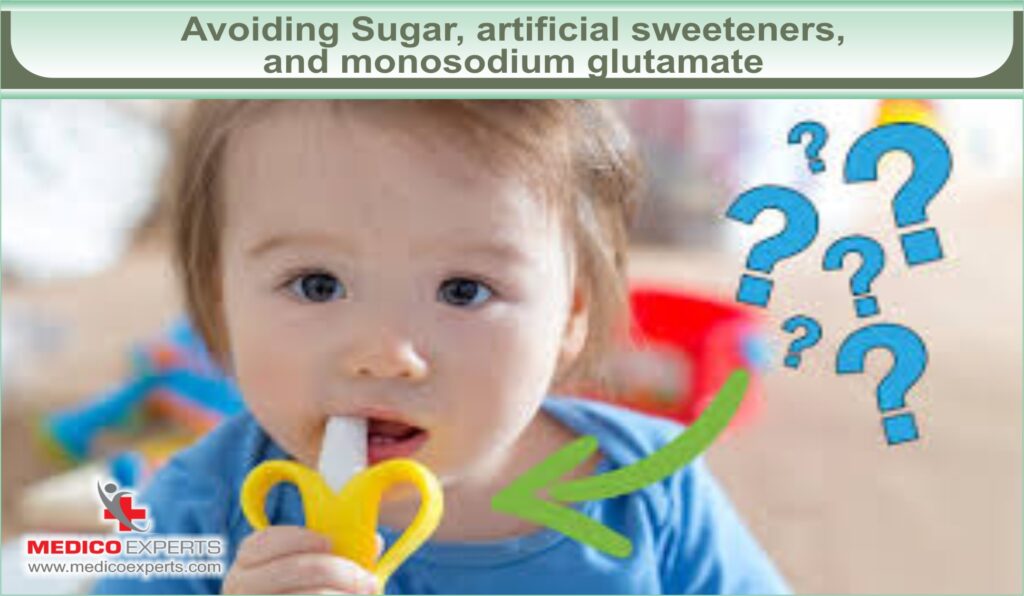
Sugars and artificial sweeteners can trigger hyperactivity in autistic children. They can even worsen the hyperactivity behavior in children by stimulating the pathways in the brain that cause hyperstimulation.
Monosodium glutamate present in Chinese food can also cause intense hyperactivity in autistic children.
4. Avoiding Crunchy Junk Food
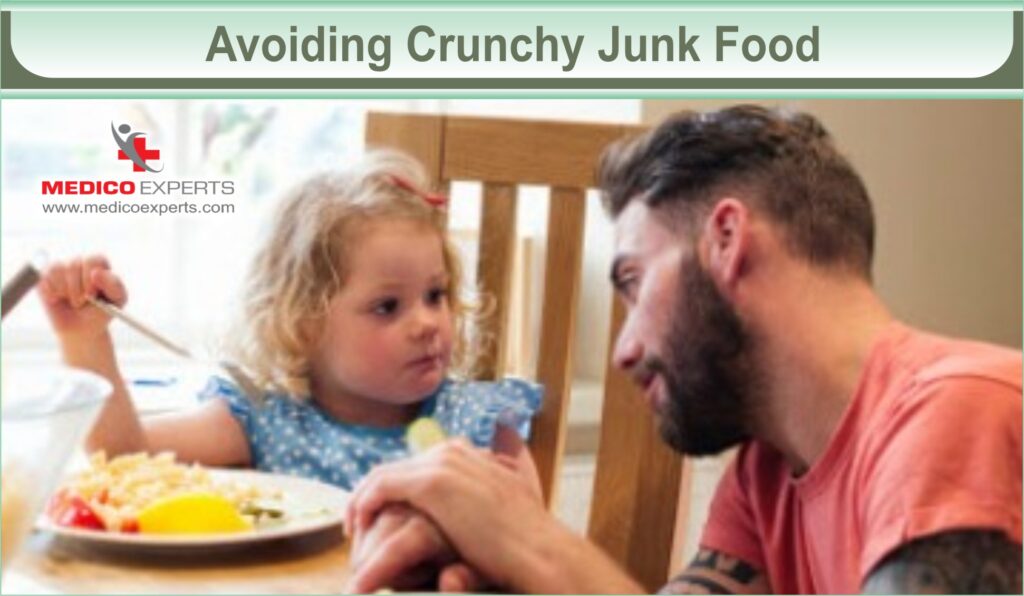
Autistic children are sensitive to different smells, tastes, and textures of food. They may not like a ripe banana but may be fascinated by crispy chicken as well as burgers with added flavor and sauce.
It is important to note that children with autism should refrain from consuming junk food as a means of satisfying their appetite. Failure to do so may result in nutritional deficiencies.
What food autistic children should have? Best Foods for Autism Recovery
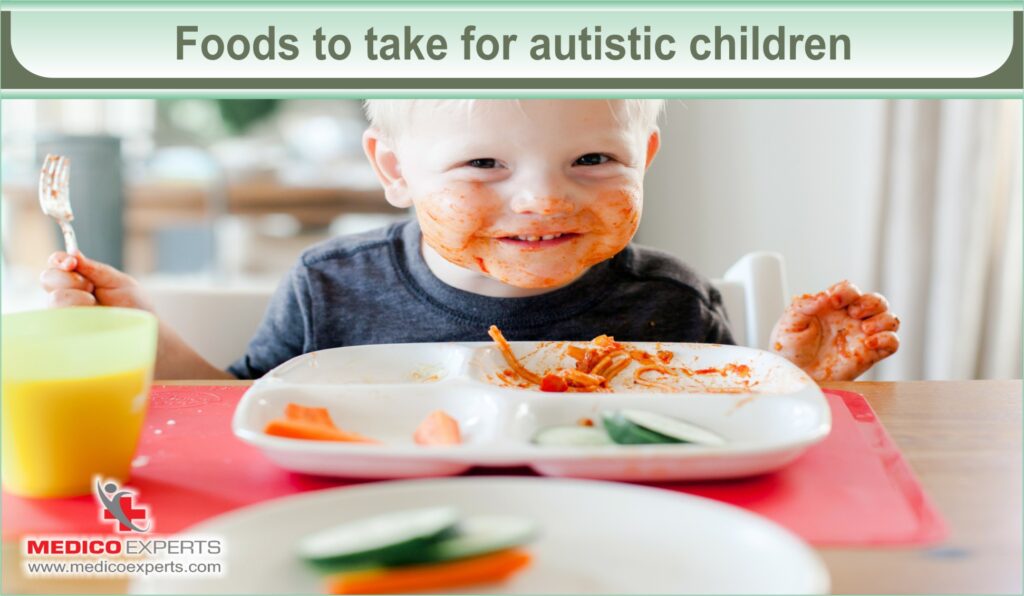
Let’s shift our focus to foods that can support the development and health of autistic children. These foods address specific nutritional needs and promote brain function.
1. Probiotic foods for autistic children
Probiotics are exceptionally useful for autistic children.
Probiotics are useful bacteria like Lactobacillus and Bifidobacterium that produce essential amino acids, neurotransmitters, and short-chain fatty acids which are all essential for the proper functioning of the brain.
Moreover, probiotics also enhance the circulation of brain-derived neurotrophic factors which are essential for brain and central nervous system function.
Apart from improving brain health, probiotics also help in digestion and proper stool formation by colonizing the intestine with beneficial bacteria.
Examples of probiotic food include- Curd, fermented food like idli and dhokla which are good for the neuro and gastric health of the autistic child
2. Food rich in magnesium and vitamin B6
Bananas, fish, and peanuts are rich in vitamin B6 and spinach, cashews and almonds are rich in magnesium.
Both vitamin B6 and magnesium are important for speech development and improving communication skills.
3. Foods that are rich in zinc and vitamin C
Zinc and vitamin C is essential for the pregnant mother as well as for autistic children after their birth.
When the baby starts eating food the child should be provided with a vitamin-rich diet such as lemon, oranges, papaya, and pineapples and zinc-rich food such as eggs, legumes, and seeds.
4. Food rich in omega-3 fatty acids
Omega-3 fatty acids are very good for the proper functioning of the brain. Walnut and cod liver oil are very rich sources of omega-3 fatty acids and should be provided to the autistic child.
5. Fiber-Rich Foods
Vegetables and fruits rich in fiber (such as Apples, guavas, and whole-grain chapati) should be given to autistic children who tend towards constipation. Moreover, proper water intake and physical activities are required to prevent constipation.
Sample Indian Diet Plan for an Autistic Child
Here’s a detailed Indian diet plan for autistic children that incorporates the best foods while avoiding harmful ones.
Early Morning:
- Warm water + Almonds and walnuts.
Breakfast:
- Scrambled eggs with whole-grain bread + Fruit salad (banana, apple, and orange).
Mid Meal:
- Fresh orange juice + Papaya slices + Dhokla.
Lunch:
- Pea pulao + Rajma + Mixed vegetable soup.
Evening:
- Herbal tea (without milk and sugar) + Kala chana chaat.
Dinner:
- Ragi chapati + Vegetable kofta + Fresh vegetable soup.
Why Consult a Dietitian for Autism?
While gluten-free and casein-free diets are popular, some medical professionals warn against excluding wheat and dairy without expert advice, as these exclusions may lead to nutritional deficiencies.
For a personalized Indian diet plan for an autistic child, consulting an experienced dietitian ensures balanced nutrition and effective dietary interventions. Remember, diet alone cannot address all symptoms of autism. Combining dietary changes with medical treatments like stem cell therapy offers a holistic approach.
Stem Cell Therapy: A Complementary Treatment
Stem cell therapy is emerging as a promising treatment for autism. This therapy involves injecting cultured cells from bone marrow into cerebrospinal fluid to reduce hyperactivity and repetitive behaviors. Consult a medical professional to understand its potential benefits.
Conclusion
Crafting the right Indian diet for autism can make a meaningful difference in the well-being of autistic children. Avoid problematic foods like gluten, casein, and artificial additives while incorporating nutrient-rich options like probiotics, omega-3s, and fiber.
However, every child is unique, and dietary needs vary. Consulting a dietitian ensures the best outcomes for your child’s health and development.
Frequently asked questions :
Q1. What is the ideal diet for autism?
Ans : The ideal food for autism is probiotics, gluten and casein-free food, and food rich in vitamins, minerals, and omega-3 fatty acids.
Q2. What foods help recover from autism?
Ans : Food alone cannot help to recover from autism. Medical treatment along with nutritious food can quicken the recovery process.
Q3. Are there any Indian vegetarian options for autism diets?
Yes, foods like idli, dhokla, lentils, spinach, and walnuts are excellent vegetarian choices.
References
- https://pmc.ncbi.nlm.nih.gov/articles/PMC7651765/
- https://pmc.ncbi.nlm.nih.gov/articles/PMC7915454/
- https://www.who.int/news-room/fact-sheets/detail/autism-spectrum-disorders
- https://www.medicalnewstoday.com/articles/327028#do-you-need-to-wash-produce
- https://pmc.ncbi.nlm.nih.gov/articles/PMC5278591/#:~:text=Chinese%20food%20and%20soups%20contain,hours%20of%20consumption%20of%20MSG.
- https://pmc.ncbi.nlm.nih.gov/articles/PMC9447427/
- https://ods.od.nih.gov/factsheets/Probiotics-HealthProfessional/
- https://pmc.ncbi.nlm.nih.gov/articles/PMC6005194/
- https://ods.od.nih.gov/factsheets/VitaminB6-HealthProfessional/
- https://www.webmd.com/diet/foods-high-in-magnesium
- https://ods.od.nih.gov/factsheets/Magnesium-HealthProfessional/
- https://pmc.ncbi.nlm.nih.gov/articles/PMC5100031/
- https://pmc.ncbi.nlm.nih.gov/articles/PMC9641984/#:~:text=Ingestion%20of%20omega%2D3%20fatty,from%20an%20omega%2D3%20supplement.
Medical Disclaimer: This content is for informational purposes only and should not replace professional medical advice, diagnosis, or treatment. Always consult a qualified healthcare provider or dietitian before making significant dietary changes for an autistic child. Individual needs and responses to dietary interventions may vary.



